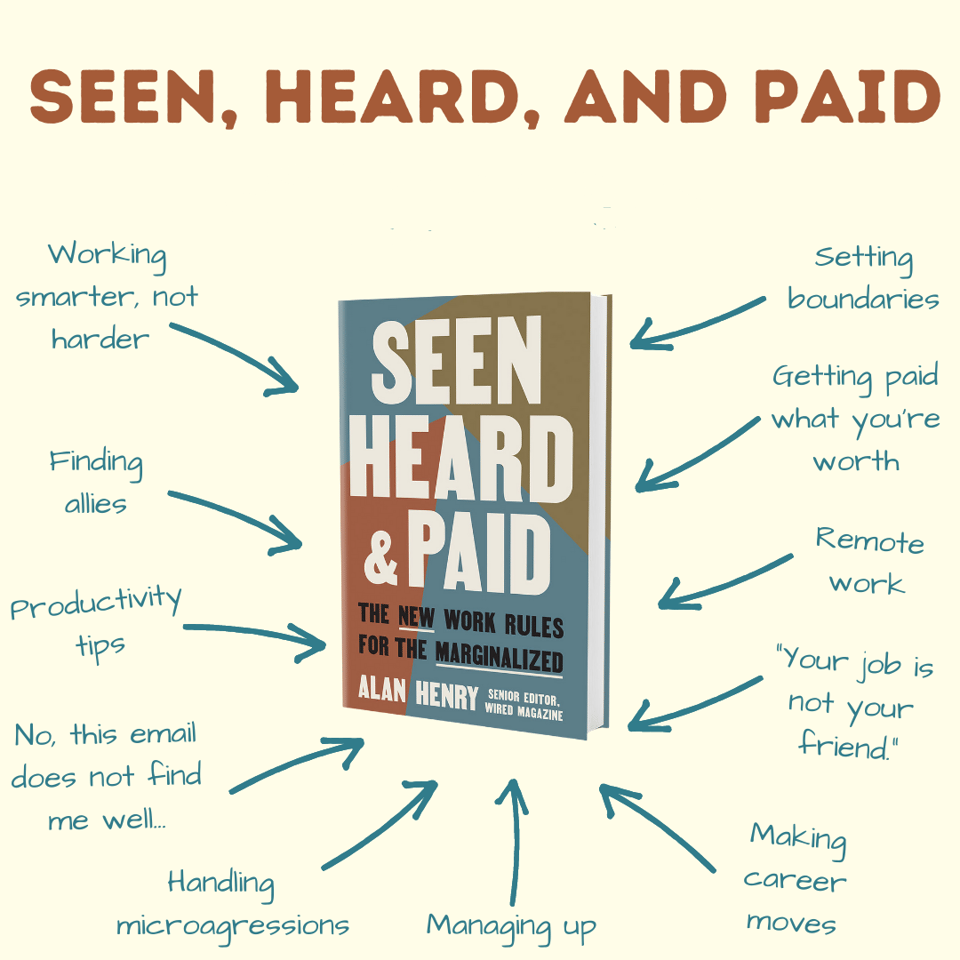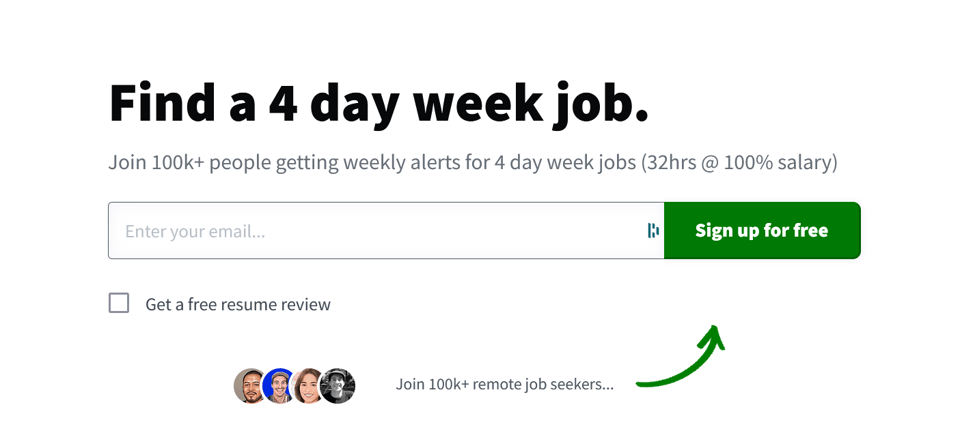New Year, New...You?

Happy New Year, such that it is, right? I’m your host, Alan Henry, author of Seen, Heard, and Paid: The New Work Rules for the Marginalized, which apparently gives me the right to tell you how to conduct your career. I’m being sarcastic, of course, because part of this edition of Productivity, Without Privilege is all about what to do when you’re angry that the people you work with people who don’t consider, care, or respect your expertise and experience in your field.
Sadly, it’s something that people from marginalized backgrounds have to deal with more than their privileged counterparts, and in the spirit of fixing problems that I myself are experiencing, I’m here to offer some tips for those of you looking for brighter career moves or just a better day at work in the new year. So before you throw up your hands, walk out the door, and burn the whole place to the ground (trust me, I understand how tempting it can be) maybe I can help first? Maybe.
When I gave a lecture at my alma mater a few years ago, one of the students came up to the microphone when I was taking questions and asked, essentially, how I deal with the anger. How I deal with the distrust, the desire to just do good work and make friends, and not be subject to all of the parlance and politics involved with being a minority in any field, whether it’s science (what I went to school for) or project management or journalism. She recounted how stressed and sad and angry her own experiences made her, and didn’t know how to process them.
I told her the same thing I’m going to tell you all now:
Your anger is righteous and justified. Don’t let anyone tell you to calm down, or let it go, or pretend like it’s not real. That’s the first thing.
The second thing, of course, is that even though it’s righteous and just and you’re feeling a natural reaction to the world around you and how people with privilege see and treat you, you still have to find a way to process those feelings into something that works for you, not against you. A way to turn the anger and the sorrow and the spite into motivation, strength, resilience, and community.
I told her that she shouldn’t have to do that, but the world doesn’t give us that choice. The only choice we get is how we deal with those feelings.
So keep that in mind as we push forward. It’s been a messy year for layoffs, and this year isn’t starting off any better. So if you’re standing on the precipice of your career and wondering what to do and how to feel, you’re not alone.
And that’s the real tip I have for you. You can keep your work diary (and you absolutely should) and you can get after-work hobbies and exercise, go for a mental health walk, and make sure to cook yourself dinner instead of eating food that’s bad for you—all those things are valid and good suggestions; ones that I should probably take. But the real suggestion I have, and the real wish I have for you this year, is that you find a supportive community.
Those of you who have been around for a while probably know that I talk about the importance of community a lot. I discuss it in my book, even! But the reason for that is because at my absolute career lowest—when I’d been tossed out like so much garbage by one manager, then subsequently walked into a toxic situation where a coworker treated me with contempt and the manager looked the other way—the only thing that helped me lift my head high was knowing that I had people who cared about me and wished for my success, and were willing to step up and do the work to keep those promises. And I would do the same for them. Surround yourself with those people, at the very least. You deserve nothing less than to be surrounded by people who care about you. And listen, no matter what your boss says, or your CEO says in your company meeting, or how much your team gets along with one another, the company that you work for is not your friend, and will never look out for you. (And yes, if you work someplace that’s an exception that proves the rule, congratulations, most places aren’t like that.)
So here are a few simple tips to help find some community, with apologies in advance that yes, this will take some effort and vulnerability on your part; you can’t surround yourself with people who care about you if you don’t allow yourself to meet new people and be cared for, okay?
Look for professional communities relevant to your industry. Whether you’re a journalist like me or a project manager like I once was, it helps a ton to connect with other people who do the same job that you do at different companies. The reason these organizations, whether it’s a group like the Online News Association or the Project Management Institute, just to name two that I’ve been a member of at one point or another, exist is to pull people together to share best practices, learn from each other’s expertise, and meet other people who work at other places.
Drill deeper for groups that reflect the ways you’ve been marginalized. A friend of mine in one of these groups reminds me often to “not go through the front door,” because, after all, privileged people don’t do that, now do they? They use connections, friendships, and networking relationships. You can too. So whether or not you join a group like the National Association of Hispanic Journalists or the Asian Educator’s Alliance, or any affinity group for your field, it helps to build a secondary network of people with similar lived experiences as you so you have, for example, some warning before you apply to a problematic company or manager.
Build your own communities if they don’t exist. A lot of industries don’t have affinity groups or professional groups that you can just jump in and get familiar with, but I’ll say this: if you notice a lack of community, you can’t possibly be the only person who notices it. So it might be time to start one, even if it’s small, of your own. One of my friends and former colleagues noticed a lack of transgender representation in journalism, so he started the Trans Journalists Association and then handed it off as it grew bigger and introduced its own style guide.
So bottom line, look around. Spend some time seeking out those folks who are feeling what you’re feeling. At the very least, you’ll meet some new people. More than that, you’ll meet some new people who understand the challenges you’re going through, and even better, they may even be able to help you find roles and opportunities that nourish you.
[ Worth Reading ]
The Incredible Shrinking Podcast Industry, by Max Tani: During the pandemic, everyone kind of shut themselves into their home offices and decided that they should launch a podcast. Honestly, best of luck to those folks, but it looks like the podcast market has reached its natural oversaturation point: despite big marketing dollars and huge ambitions by every media org everywhere, the number of people with time to listen to podcasts is shrinking, and quickly. Max Tani has the whole story for Semafor, but it’s worth checking out if your 2024 goals involve starting a new podcast to build your personal brand. Might be worth doing something else, unless you’re sure you have a winning strategy (or it’s a passion project, in which case, have at!)
Matthew Henson: The US’ Unsung Black Explorer, by Robert Isenberg: I would have loved for this story to have been written for the BBC by a Black correspondent or features writer, but I can’t ask for too much when I’m just happy that such a comprehensive story even exists. I’ve been fascinated by Henson’s journeys, life, and of course, how other explorers of the time treated him, all for the crime of wanting to do what they did while Black, my whole life. If you want to read the actual story of who “discovered” the North Pole, here it is.
The Perfect Webpage, by Mia Sato: One of the strangest things about being a tech journalist for as long as I have is watching how Google’s influence and power has absolutely shaped the web, and not exactly for the better. People build websites now not for readers or users, but for Google and its algorithms, and of course the law of the land: SEO. You know, that industry designed to peer into the crystal ball of Google and decipher why they keep making changes (except, you know, without actually knowing what the changes are and why they’re being made.) It’s a grift that keeps on grifting, and this piece is a great one that cuts through why the web is just so awful right now.
[ Try This ]

I know I’ve been talking a lot about finding community in this newsletter, but down here in this section, I want to offer you a tool that might just help you find a new job. So if you’re on the hunt for a new gig, allow me to recommend 4 Day Week.
I’ve been subscribed to 4 Day Week’s newsletter for a while now, and while the jobs inside aren’t always relevant to me, I am pleased to see that someone has put together a solid, running list of jobs that are either (or, usually both) remote-friendly and offer 4-day workweeks for full salary. It may sound like a dream come true, and honestly, it may very well be depending on which listing you’re looking at, but there’s plenty to look around and choose from, and a bunch of companies listed that you can do your own research on to see if maybe they have some other gigs you’d be a good fit for if there’s nothing in the newsletter for you.
The big thing for me though is finding more opportunities that respect the desire of many professionals to work remotely, instead of forcing everyone back into expensive real estate so mediocre managers can feel good about their bullying. Combined with the option to reclaim one day per week for your personal life without taking a salary cut for it is pretty sweet. So sign up, tell them Alan sent you, and hopefully you’ll find something awesome soon. And if you do, you’d better let me know about it, okay?
I’ll see you back here soon.